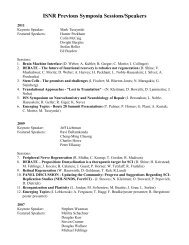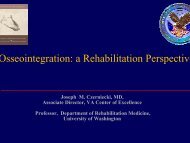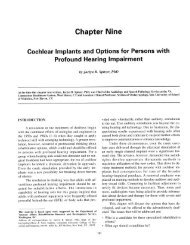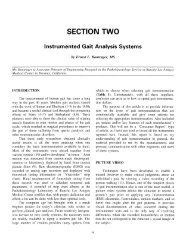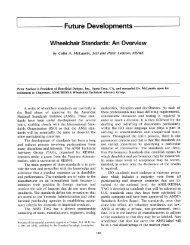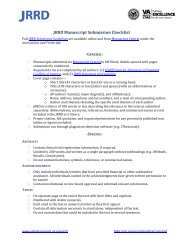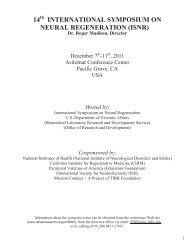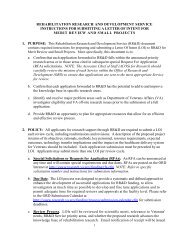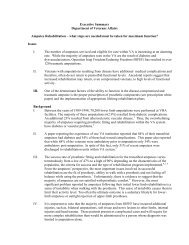Pharmacotherapy for posttraumatic stress disorder - Rehabilitation ...
Pharmacotherapy for posttraumatic stress disorder - Rehabilitation ...
Pharmacotherapy for posttraumatic stress disorder - Rehabilitation ...
You also want an ePaper? Increase the reach of your titles
YUMPU automatically turns print PDFs into web optimized ePapers that Google loves.
710<br />
JRRD, Volume 49, Number 5, 2012<br />
group, add psychotherapy, or address specific symptoms<br />
such as sleep disturbance with agents such as prazosin <strong>for</strong><br />
nightmares or sedating antidepressants such as trazodone<br />
or mirtazapine. Medical management of severe anger<br />
outbursts is difficult. Studies treating PTSD-related anger<br />
with mood stabilizers such as divalproex or the atypical<br />
antipsychotic risperidone have failed to show efficacy<br />
[18,78]. Psychotherapy, behavioral interventions, and use<br />
of different first-line agents are the best approach supported<br />
by the available evidence and are recommended in<br />
the 2010 revision to the CPG.<br />
Second-line agents can be considered as the next<br />
treatment step if these first-line agents are not effective in<br />
treatment (Figure). We recommend doing this in consultation<br />
with a specialist in pharmacotherapy in psychiatric<br />
<strong>disorder</strong>s, given the potential side effects from these<br />
medications.<br />
Figure.<br />
Stepped care <strong>for</strong> pharmacotherapy in <strong>posttraumatic</strong> <strong>stress</strong> <strong>disorder</strong><br />
(PTSD). Adapted from Department of Veterans Affairs/Department<br />
of Defense Clinical Practice Guideline <strong>for</strong> Management of<br />
Post-Traumatic Stress. SNRI = serotonin-norepinephrine<br />
reuptake inhibitor, SSRI = selective serotonin reuptake inhibitor,<br />
TCA = tricyclic antidepressant, TX = treatment.<br />
DISCUSSION<br />
Trauma-focused psychotherapy is the recommended<br />
first-line treatment <strong>for</strong> PTSD [85], but pharmacotherapy<br />
plays an important role <strong>for</strong> patients as an intervention<br />
because of patient preference and/or limited availability<br />
of psychotherapy. Medications can play an important role<br />
<strong>for</strong> PTSD symptom reduction, which can improve the<br />
engagement of patients in their treatment.<br />
Given the medication choices available, it is important<br />
to begin with agents as recommended in the CPG. In<br />
our collective experience, the SSRIs and venlafaxine<br />
carry the strongest evidence of effectiveness and safety<br />
and most patients will have at least a partial response to<br />
these medications. These medications potentially are of<br />
most benefit to the patient and provide a solid treatment<br />
foundation <strong>for</strong> further mental health care, ideally one of<br />
the trauma-focused psychotherapies. Given the modest<br />
long-term results from pharmacotherapy, an entirely reasonable<br />
treatment strategy is referral to trauma-focused<br />
psychotherapy after the medication response reaches a<br />
plateau. Ongoing medication changes are unlikely to<br />
bring about the same degree of improvement as traumafocused<br />
psychotherapy, and referral to such therapy is<br />
often indicated <strong>for</strong> the patient’s recovery.<br />
For patients who cannot tolerate the first-line medications,<br />
mirtazapine is a reasonable second-line medication,<br />
although evidence <strong>for</strong> its effectiveness is not as strong as<br />
<strong>for</strong> first-line agents. Nefazodone is effective <strong>for</strong> PTSD but<br />
is associated with rare but serious hepatotoxicity. TCAs<br />
may be used but have significant side effects and carry the<br />
risk of toxicity if taken in an overdose. MAOIs would best<br />
be used under the supervision of a prescribing psychiatrist<br />
experienced with their use. Certain agents, such as atypical<br />
antipsychotics like monotherapy and benzodiazepines,<br />
should be avoided. Furthermore, initiating benzodiazepines<br />
may interfere with psychotherapy initiated later in<br />
treatment, as illustrated in the earlier case vignette.<br />
Recognizing and treating comorbid conditions are<br />
also key to successful pharmacotherapy. Making the right<br />
choice of medication depends on the patient’s unique situation<br />
and preferences. For example, a patient might<br />
accept some sexual dysfunction on an SSRI if the SSRI<br />
reduces traumatic nightmares or irritability. In all cases,<br />
the patient preferences, comorbid medical and psychiatric<br />
conditions, evidence <strong>for</strong> treatment, and outcomes should<br />
all be considered while minimizing side effects. Consultation<br />
with mental health is an important step following



